
Israeli Prime Minister Benjamin Netanyahu speaks at the Knesset, the Israeli parliament, in Jerusalem, on May 30, 2019. (Xinhua/Gil Cohen Magen)
by Keren Setton
JERUSALEM, May 30 (Xinhua) -- Just six weeks after Israelis took to the polls, the parliament, known as the Knesset, dissolved itself on Wednesday and scheduled another general election for mid-September of this year.
The latest development came after Israeli Prime Minister Benjamin Netanyahu failed to form a coalition government. His deadline, which expired at Wednesday midnight, came after weeks of negotiations with several parties.
While other right-wing and ultra-orthodox parties reached an agreement with Netanyahu's Likud party, once ally Avigdor Lieberman refused to make concessions and made it impossible for the Israeli leader to lead a majority in the Knesset.
Lieberman leads the ultra-right Yisrael Beiteinu party. His principle demand was to follow through on a law that mandates all ultra-orthodox Jews to be drafted into the army, just like secular Jews do. For years this has been a controversial topic in Israel, but this time Lieberman took his policies to the brink.
"It's an important matter - but not that important that we need to be dragged into another election," said Ohad Elkayam who works in Jerusalem.
Now, just months after elections, Israelis will head to the polls once again in the fall. Never has Israel held general elections twice in the same year.
"I was sure that in the final hours they would announce that it all worked out and they have reached an agreement through negotiations - it surprised me and everyone I know," said Ehud Choona, a Jerusalem resident.
The newspaper headlines also portrayed similar sentiments. "Such a day has never been seen at the Knesset," one of the headlines read.
"I think that nobody predicted this scenario, this is really a huge surprise because the laws that we know about politics, that at the end of the day, at the last minute - they always agree," said Gideon Rahat, a professor at the Israeli Democracy Institute.
Netanyahu, who has been in position for a decade, is set to become Israel's longest serving prime minister. While this is a record he will break anyway this summer, his political future seems uncertain. Asking the people for a renewed mandate just weeks after the majority voted for him is a political gamble which even he cannot predict the outcome of.
For years, he has been considered by many in the country as a political magician who is constantly at least one step ahead of his rivals. But this time, it appears the ground beneath him is not as stable.
For starters, his magic-making did not work in consolidating a coalition that would have averted the crisis altogether. The very fact that he struggled to do so, even before it was known he would fail, was surprising to many.
He is also in a precarious legal situation, under the threat of several corruption indictments the fate of which to be determined in the following months.
Yet, armed with vast political experience, he must not be underestimated.
"We know Netanyahu for many years and I think it might not be the last word because he's very strong," Rahat told Xinhua.
"He demonstrated relative weakness but he is a very stubborn person and very strong and I think that it's not over yet but definitely several times he proved that he is not as strong as he was before. Everything is open," said Abraham Diskin, a political scientist from the Hebrew University in Jerusalem.
According to Israeli law, Netanyahu was to concede his failure to form a coalition to the president and let him designate another candidate to attempt to form a coalition. But the Israeli premier jumped the gun and promoted a bill dissolving the Israeli Knesset leading the country to renewed elections. It is a huge gamble.
But otherwise, the president would have granted Benny Gantz, Netanyahu's main political rival, the opportunity to try and form a government. This was apparently a risk Netanyahu was not willing to take.
"He (Netanyahu) doesn't have the confidence that he is going to win the next elections, but you know - between the alternatives to giving up and trying to gamble again - I think from his point of view, he made the right gamble," Diskin told Xinhua.
Gantz leads the centrist Blue-and-White party which got the same amount of mandates as the Likud did - 35. However, he did not have as many partners for a coalition government as Netanyahu did, or at least thought he did.
In the hours after the decision on elections was made, Israelis were in a state of surprise. Many were upset and there was criticism of the politicians about the high cost of elections. Just recovering from an election period, the Israeli economy and government are now forced to continue to function at a relative standstill as another round of elections is expected.
Potential voters are increasingly disenfranchised.
"Politicians think only of themselves, about what they want and not what the people want...What we need is sometimes for them to be flexible for the good of the people," said Rachel Ajami in Jerusalem.
"No one understands and cannot understand what has just happened, because we don't understand! We don't understand!" Ruth Shlomovitch said, "There's a limit!"
Just five months after the April 2019 election, will Israelis head to the polls in similar numbers? Will there be a decrease or increase in voter turnout?
Diskin believes turnout might be higher than the previous and very recent 68.5 percent.
"It's going to be very tense because you know, now people have emotions about it and when people are emotional and when the elections are close, it's going to be a very close kind of campaign, the turnout doesn't tend to be low," Diskin said.
As Israel will head to the second snap elections within a year, the immediate future for the Israeli political system is cloudy at best.

